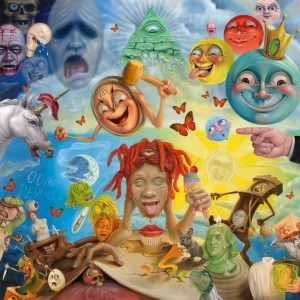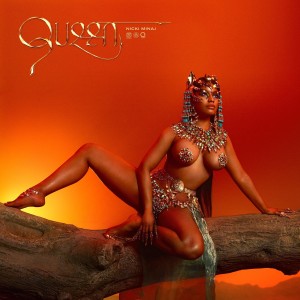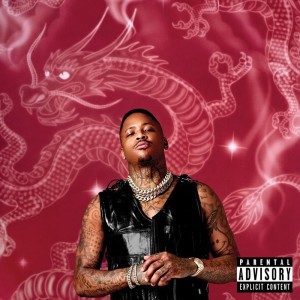In an effort to reboot our music coverage, In Review Online has launched monthly features devoted to reviewing new album releases. One such feature is What Would Meek Do? — in which SoundCloud junkies Paul Attard and Joe Biglin run down some of the latest rap releases. The second issue of What Would Meek Do? features takes on legends in their own time (Eminem’s Kamikaze, Nicki Minaj’s Queen), various kinds of cloud rap (Trippie Redd’s Life’s a Trip, Young Thug & Young Stoner Life Records’ Slime Language), and some rappers scorned for going off/sticking to their scripts (Aminé’s OnePointFive, YG’s Stay Dangerous).
 Young Thug has always had a way with words — not necessarily in terms of the words themselves, but with regard to how he says them. His verses may play fast-and-loose with the English language in a way that gives traditional hip-hop heads a heart attack, but it’s never less than fascinating just how Thug emotes through the cadences of his voice. So it’s fitting that the Atlanta trapper’s new album Slime Language gestures toward the creation of a dialect that few could claim fluency in — the few being members of Thug’s Young Stoner Life Records, whose shared billing as co-headliners here gives them a kind of Rosetta Stone. While originally advertised as a solo project, the YSL artists constantly impress for how seamlessly they fit into the auteur’s deliberate soundscape. There’s Karlae (who was once engaged to Thug) passionately rapping “these bitches ain’t slime enough” with such Auto-Tuned verve that she nearly matches Jeffery’s wildly shrill chorus; Gunna (who’s featured on four tracks, more than any of his YSL peers) being the heir to the warbled-mumble throne, finding a way to sound subdued riding the monstrous beat of “Scoliosis” while bragging that his whips come with toilets; and Thug’s sisters, HiDoraah and Dolly, holding it down on their own track while exploring differing vocal approaches on the poppy “Expensive.” While these artists form a strong sense of cohesion, as a collective, the strongest sole performer here is (unsurprisingly) Thug himself. Coming fresh of his relatively lowkey (and honestly terrible) Hear No Evil EP, it’s exciting to hear Thugger in top form on Slime Language, offering up absurd vocal performances that range from the ear-splitting taunt of “Audemar” (think the gruffness of “Harambe” but with a higher-pitched delivery and more ludicrous lyrics like “I need my bags, man, I’ma come through like Aladdin”), to the country-inflected “Dirty Shoes,” where Thug is casually able to sneak “I just wiped my dick off with the Rolls Royce curtains” into a melody akin to the stickiest of choruses off of last year’s Beautiful Thugger Girls. Even when the rapper settles into a more conventional mode, there’s a certain undeniable timber in his voice that vacillates wildly between low-range mutterings (“Gain Clout”) and high-energy stormers (opener “Tsunami”). Slime Language is such a packed album, in terms of pure strangeness, that when Lil Uzi Vert and Lil Baby show up, they’re completely overshadowed by the performances of both Thug and the YSL crew — which gives hope that the exhilarating oddball style that Thug flaunts, with some inconsistency, doesn’t have to live and die with him alone; that there can slime for all seasons. Paul Attard
Young Thug has always had a way with words — not necessarily in terms of the words themselves, but with regard to how he says them. His verses may play fast-and-loose with the English language in a way that gives traditional hip-hop heads a heart attack, but it’s never less than fascinating just how Thug emotes through the cadences of his voice. So it’s fitting that the Atlanta trapper’s new album Slime Language gestures toward the creation of a dialect that few could claim fluency in — the few being members of Thug’s Young Stoner Life Records, whose shared billing as co-headliners here gives them a kind of Rosetta Stone. While originally advertised as a solo project, the YSL artists constantly impress for how seamlessly they fit into the auteur’s deliberate soundscape. There’s Karlae (who was once engaged to Thug) passionately rapping “these bitches ain’t slime enough” with such Auto-Tuned verve that she nearly matches Jeffery’s wildly shrill chorus; Gunna (who’s featured on four tracks, more than any of his YSL peers) being the heir to the warbled-mumble throne, finding a way to sound subdued riding the monstrous beat of “Scoliosis” while bragging that his whips come with toilets; and Thug’s sisters, HiDoraah and Dolly, holding it down on their own track while exploring differing vocal approaches on the poppy “Expensive.” While these artists form a strong sense of cohesion, as a collective, the strongest sole performer here is (unsurprisingly) Thug himself. Coming fresh of his relatively lowkey (and honestly terrible) Hear No Evil EP, it’s exciting to hear Thugger in top form on Slime Language, offering up absurd vocal performances that range from the ear-splitting taunt of “Audemar” (think the gruffness of “Harambe” but with a higher-pitched delivery and more ludicrous lyrics like “I need my bags, man, I’ma come through like Aladdin”), to the country-inflected “Dirty Shoes,” where Thug is casually able to sneak “I just wiped my dick off with the Rolls Royce curtains” into a melody akin to the stickiest of choruses off of last year’s Beautiful Thugger Girls. Even when the rapper settles into a more conventional mode, there’s a certain undeniable timber in his voice that vacillates wildly between low-range mutterings (“Gain Clout”) and high-energy stormers (opener “Tsunami”). Slime Language is such a packed album, in terms of pure strangeness, that when Lil Uzi Vert and Lil Baby show up, they’re completely overshadowed by the performances of both Thug and the YSL crew — which gives hope that the exhilarating oddball style that Thug flaunts, with some inconsistency, doesn’t have to live and die with him alone; that there can slime for all seasons. Paul Attard
On paper, Kamikaze should work: It’s Eminem returning to his battle rap roots, cutting out the overblown pop choruses and cringy classic rock samples that plagued his last album, while going after every mumble rapper under the sun and anyone else who has dared to utter a negative word against him in recent years. But paper is a flimsy thing that tears easily and is cockled when wet… anyway, Kamikaze mostly isn’t good. For one, Em has never sounded this horribly jaded (which is saying a lot for the guy who wrote coldly about killing his ex-wife). On “Lucky You,” Em describes the SoundCloud generation as “half of these rappers have brain damage / All the lean rappin’, face tats, syruped out like tree sap.” For a man so dedicated to preserving hip-hop, it’s often astonishing how many stereotypes he perpetuates about this culture in order to posture himself as the last vanguard in an era that doesn’t respect real craft — not to mention his last seven albums debuted number one on the Billboard Top 100, and he’s arguably one of the most respected legacy MC’s in the game. It’s that last factoid that fatigues Kamikaze‘s anger, making the album feel less like an old guard’s last hurrah and more just a dude angry people clown on his mom’s spaghetti. The tactics used to attack these supposed haters run the gambit from wildly offensive homophobia (calling Tyler, the Creator a “faggot”; telling music journalists to “get a mouthful of flesh”), using real-world domestic violence as a punchline to settle petty personal quarrels (he refers to Joe Budden’s last hit being “smacking bitches”) to juvenile mimicry one would expect from a five-year old throwing a temper tantrum. “Not Alike” is the worst offender in that regard, featuring Royce Da 5’9″ and his white partner in crime rapping over a Tay Keith beat that samples “Look Alive” and interpolating the Migos, turning the earworm chorus of “Bad and Boujee” into a groan-worthy attack on mindless music (“Brain dead, eye drops / Pain meds, cyclops“). When Em’s not copying music better than his own and mocking it, or bitching about perceived injustices (“Revival didn’t go viral”), he’s using his agro, robotic flow in a way that technically sounds impressive, but is also so densely packed with Russian doll-rhymes as to feel bereft of emotional weight and essentially airless, suffocating under the weight of incessant rapid-fire wordplay. Still, Kamikaze is a better Eminem album than usual for a few reasons: It’s refreshingly economical and to-the-point (a brisk 45 minutes compared the hour-plus ordeals of Recovery and Revival), there’s a general momentum to the production (like the kooky, yet exhilarating self-titled track), and there are even moments here of actual introspection. “Stepping Stone” has Em in full apology mode, addressing his former group D12 — much like “Headlights” did for Em’s mom — and hearing Slim Shady grow up and address an issues like this is satisfying. But it’s also the exception, and Kamikaze tends instead to feel indignant and ornery — and quickly turns into Old Man Yells at (Sound)Cloud. Paul Attard
“Jealousy is a disease / die slow,” Nicki Minaj whispers to her critics at the end of “Majesty.” It’s devilish — almost pure evil — for the star to wish death upon those envious of her success. Between encouraging fans to harass said critics and enabling the sex-offender “king of New York” on chart-topping “FEFE,” Nicki, on her latest LP Queen, reiterates again and again that the games are over and that it’s time to pay the piper. “Before you suck me off, get a knee pad,” she insists on the Mike Will-produced “Good Form,” and if any entity’s power rivals Minaj’s in her kingdom, it’s her own vagina (see “Rich Sex” for more details). No longer content to be a mere comic-book villain, as she was during her “Roman” phase, Nicki ups her status to haughty despot. On “Barbie Dreams,” she enumerates a long list of male contemporaries and highlights their ‘flaws’ in some of the most base, lowest-common-denominator, Young Money Records way possible. For example: “Had to cancel DJ Khaled, boy, we ain’t speaking / Ain’t no fat n**ga tellin’ me what he ain’t eatin’.” One particular run of songs towards the middle of Queen, though, offers a brilliantly unsettling vision of Nicki going full-throttle, pushing the limits of her vocal range, flows, and lyricism. Swae Lee’s haunting vocal work on “Chun Swae” provides a foundation for Nicki to record something akin to her own “Everything,” the galvanizing Nas/Kanye West duet. But instead, like Young Money brethren Drake on his last album, Nicki delves deep into her narcissism: at the end of the track’s first verse, the bar/ad lib “If he say he don’t want me back, he be lyin’” is followed by an awkward silence. Moments like this one, along with Nicki’s multiple bouts of unhinged laughter and her countless assertions of her own deserved royalty, make the artist’s album-long act seem chillingly convincing. The ad libs on “Chun-Li” go as far as to suggest a Fake News-style victimization (“Get on their fucking keyboards to make ME the bad guy”), further ratcheting up the crazy so as to compel some kind of emotional engagement, even if it’s disgust — and maybe it’s supposed to be. All this results in some major bangers — ones that are only more compelling for how revolting they are. And while it’s Nicki’s insistence on indulging her whims that enables this caricature of queenhood, it also leads to ill-fitting juxtapositions like those between the bullish, Eminem-featuring insult track “Majesty” and the overproduced pop of “Come See About Me.” Ultimately, Nicki’s claim to the throne feels illegitimate, with her reliance on sounds popularized by other artists leaving Queen in the company of The Carters, this year’s other fraudulent pop coronation. Joe Biglin

When YG snarls, “Fuck the president, fuck the Po-po” on Stay Dangerous opener “10 Times,” he doesn’t do so proudly or with any detectable joy, but rather with dejection in his voice. The man behind perhaps rap music’s fiercest screed against our 45th President (“FDT,” or “Fuck Donald Trump“) sounds, nearly two years on, defeated. There’s nothing as wildly political or righteous here as “Blacks & Browns” or “Police Get Away With Murder,” and Stay Dangerous‘s string of tracks of boastfulness and booling antics range from passable (the melodic and quick-tempoed, if sloppy, “Suu Woop”) to pointless (the lethargic “Pussy Money Fame”). One highlight is the swaggering posse-cut, “Big Bank,” where DJ Mustard’s minimal beat is shaped by a repeating marimba-led instrumental and serves as the perfect vessel for YG’s cockiness (“I got white folks money that I won’t blow”), 2 Chainz’s absurdity (“big sack, a lotta hoes like Santa”), Big Sean’s boyscout-ish one-liners (“I’m rare as affordable health care”), and Nicki Minaj’s assertions that, yes, she is indeed the queen. It’s the most fleshed-out song on Stay Dangerous — but almost immediately afterwards, with the track “Power,” YG ruins all that goodwill by trotting out the ever-more-one note Ty Dolla Sign to waste everyone’s time recounting once again just how much he can’t control himself around good pussy. Things are left up to Stay Dangerous‘s closing track, “Bomptown Finest,” to capture the triumphal spirit of YG’s ascension in the rap game, and trumpet his commitment to staying true to himself. And fittingly it’s probably the best track on the album, but it’s also a bit of an ill-fitting finale for this particular set. Simply put, YG sells-out to a lower common denominator on Stay Dangerous, sacrificing some of the personal veracity and political edge that helped make him so popular in the first place. Paul Attard






Comments are closed.